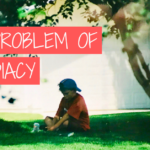[Audio Version]
How do I become more patient?
Why do I constantly let fear stop me from performing well?
Why am I so quick to blame others?
These questions are quite common, and as an athlete, I would often ask myself similar ones. After a big game where I screwed up in a pressure moment, I would curse myself for not handling the spotlight better. I would wonder what I could do to immediately fix this issue, I’d think about it, and try to be better for the next time.
Maybe I would watch a TED talk about fear, or read an article about anxiety. I might even ask someone how they handle pressure.
These were all great steps in the right direction. But they weren’t enough.
I was looking for some elaborate reason as to why I handled pressure so poorly. I was searching for an explanation rather than a solution. And quite simply, I missed the one thing that could have solved this problem.
Practice.

What’s Your Problem?
Each one of you has your own version of this problem. You have a unique mental barrier, which holds you back from achieving peak performance.
For some of you it’s anger, a lack of self-confidence or maybe you have a habit of blaming others. Regardless of which one it is, this issue always seems to surface in the big moments and it knocks you off your game. You let it take over and ultimately; it stops you from being your best when it matters most.
The biggest issue, however, is that it’s not until the dust has settled and you’re alone in your room that you begin to realize exactly what it was that caused you to underperform.
And it’s in this moment you vow to never be like that again. You do a little research, maybe watch a motivational video, and tell yourself you’ll be better next time.
And then what happens?
Well, two days later, something unexpected comes up which throws you off your game and summons this deep seeded issue – thus sending you into a spiral of self-defeat.
But what did you expect?
You didn’t actually do anything to fix the problem.
You simply made some half-hearted promise that was largely based on emotion and a passion filled response.
There was no reasoning, no rationality, and definitely no planning made in this decision.
You simply said, “I want to stop doing X during competition”.
And here is where my earlier point of practice comes into play. When we challenge ourselves to stop or start doing something, we are immediately putting ourselves in an extremely disadvantageous position.
Essentially, we’re expecting to be able to stop an ingrained emotional response during a moment of high stress. And this is all done despite that fact that we never learned how to control this response in low-stress environments.
Let me rephrase that more clearly with a question.
How can you expect to be able to do something when it’s hardest, if you’ve never practiced when it’s easiest?
You say you don’t want to be an angry teammate, but what did you do last time someone cut you off in traffic? You tell yourself you want to be better in pressure moments, but you can’t even handle your nerves in the final moments of a recreational game of bowling.
Whatever your weakness is, you most likely don’t practice dealing with it during the easiest moments. Instead, you chalk up your response to these casual conflicts as unimportant and “just something everyone else does”.
But they do actually matter. Like a lot. Every single one of them. They are what build up habits and create your automatic responses.
In fact, during times of stress, anger, and tiredness it is the prefrontal cortex which is the first to go offline. Why does that matter? Well, that little section of your brain is responsible for several things; mostly short-term memory and decision-making. But along with that, willpower.
So, without the willpower function of your brain, what do you have left? Habits.
Deeply rooted habits that have developed over time.
To expect your high-strung, stressed out, and anxious brain to remember that random little promise you made to yourself 4 days ago is simply absurd.
You need to be realistic.
Here is what I propose
- Figure out your mental weakness
- Start to pay attention to it on a daily basis. Not just in sports.
- At the end of every day, reflect and write down when you experienced this weakness
- After 14 days, review your recordings and look for patterns
- Identify the common situations, interactions, and confrontations which cause this reaction
- Work on avoiding these reactions by preparing for the situations ahead of time
- Over time you will get better at controlling this emotional habit and be able to address it even during the moments of high stress
- Be patient.
-DT





